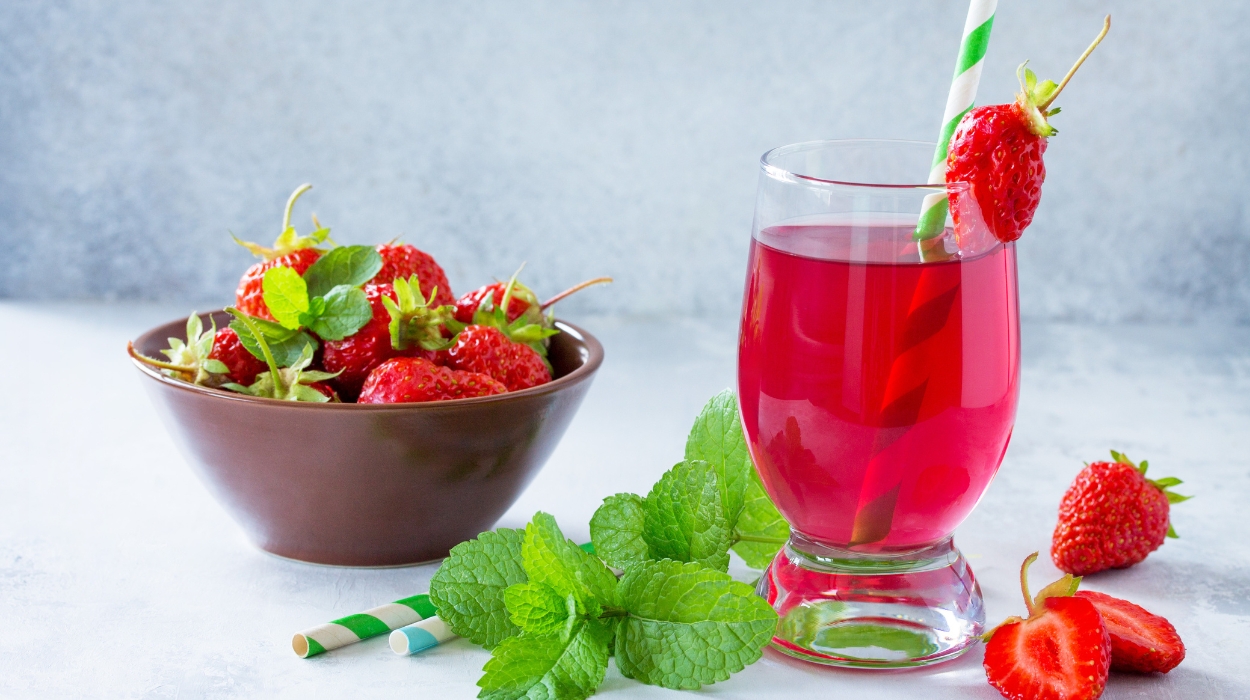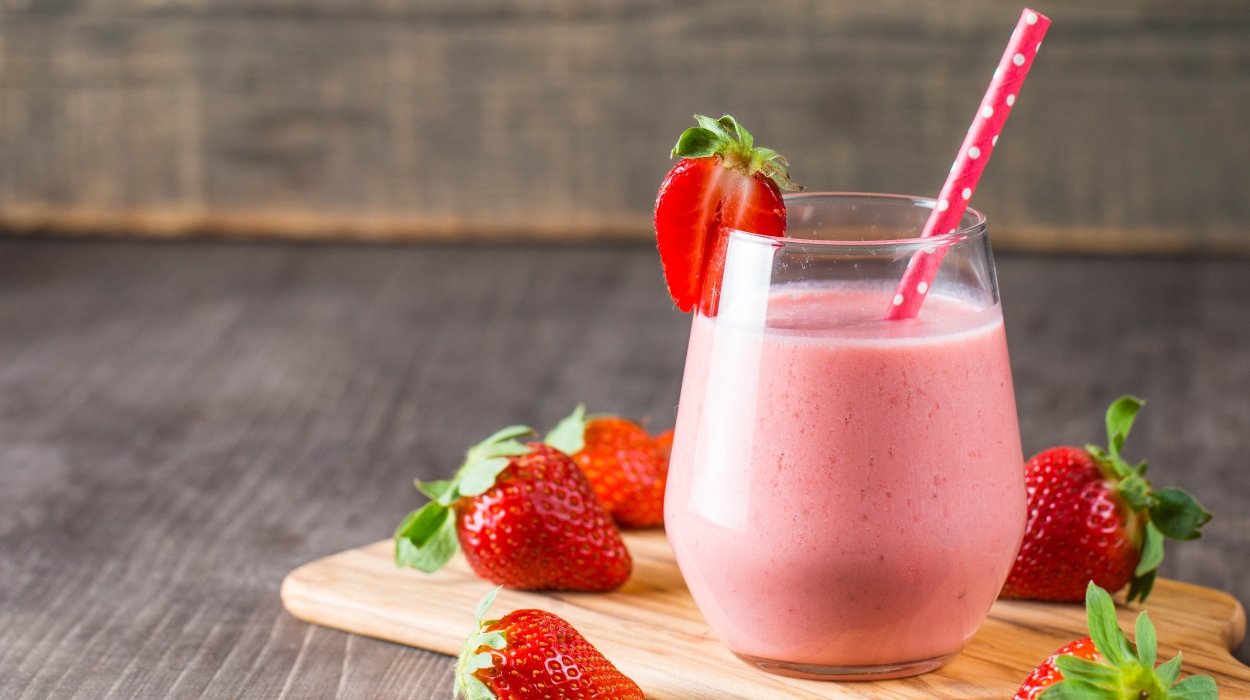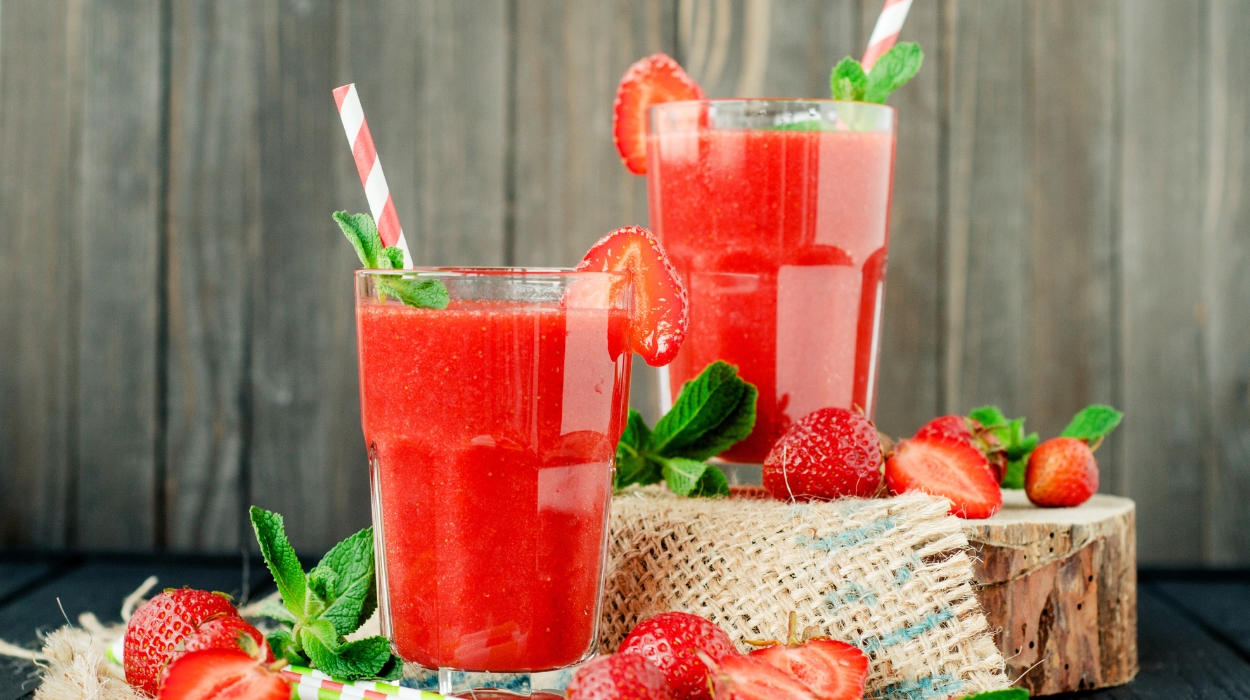Fresh strawberry juice is a tasty and refreshing beverage packed with many nutrients. Drinking a glass of strawberry juice provides essential vitamins, minerals, and antioxidants that contribute to your overall well-being. Incorporating strawberry juice into your diet brings a diverse array of health advantages, from supporting weight management to boosting immunity.
Let’s discuss the health benefits of strawberry juice. We’ll explore creative and refreshing ways to add this healthy fruit to your daily intake. You’ll also learn the simple process of making your own strawberry juice.
What Are The Benefits Of Strawberry Juice?
The most impressive health benefits of fresh strawberry juice include:
- Anti-inflammatory properties.
- Weight loss support.
- Lower heart disease risk.
- Cancer prevention.
- Boosted immunity.
- Improved digestion.
- Regulated blood sugar.
- Improved brain function.
- Improved eye health.
- Healthy skin.
Benefits Of Strawberry Juice

Anti-Inflammatory Properties
One of the most sought-after benefits of strawberry juice is its anti-inflammatory properties. Rich in antioxidants and phytochemicals,[1] strawberries contain anthocyanins, ellagic acid, and quercetin. These compounds work by neutralizing free radicals, alleviating oxidative stress,[2] and controlling inflammatory responses in the body.
Organic strawberries are known to contain higher levels[3] of the beneficial nutrients commonly found in this fruit. So going organic may be the best choice nutritionally.
Regular strawberry juice consumption can reduce the risk of chronic inflammatory conditions like arthritis[4] and asthma. Vitamin C in fresh strawberry juice also helps reduce the inflammatory symptoms of gout and arthritis.
Weight Loss Support
Strawberry juice is low in calories and high in natural sugars, which helps create a sense of satisfaction and curb unnecessary cravings. There are 8 grams of natural sugars[5] in one-half cup of fresh strawberry juice, offering a sweet fix without guilt, a healthy way to combat sugar cravings. Furthermore, antioxidants such as catechins and quercetin may boost metabolism and increase the body’s ability to burn calories.
Strawberry juice is also considered a hydrating beverage, a crucial component of any weight loss regimen.
Lowers Heart Disease Risk
Strawberries have an abundance of antioxidants that support heart health. Flavonoids and polyphenols in strawberries[6] offer anti-inflammatory effects and support optimal blood circulation. Consuming strawberries allows you to take advantage of these properties to decrease your risk of heart disease and various cardiovascular conditions.
Additionally, anthocyanins and quercetin in fresh strawberries help combat oxidative stress, promote proper blood flow, contribute to arterial health,[7] and control blood pressure. The pectin in strawberries may be responsible for lowering blood pressure[8] and improving cholesterol[9] levels.
Cancer Prevention
Strawberries are an excellent source of vitamin C and fiber. Both offer a protective shield against cancer,[10] known to prevent breast, lung, mouth, and esophageal cancers. The ellagic acid and quercetin in strawberries also provide anti-cancer properties.[11] They combat free radicals, which initiate cellular damage that may eventually lead to cancer.
Additionally, the anthocyanins responsible for the fruit’s vivid red color may also prevent the growth of cancer cells.[12] Incorporating strawberries into your diet may be a proactive step towards cancer prevention.
Boosts Immunity
Strawberries contain more vitamin C[13] than oranges. This helps strengthen the body’s natural defenses against infections and illnesses. The antioxidant-rich profile of strawberry juice further enhances its immune-boosting potential by combating oxidative stress and inflammation.[6]
Incorporating strawberry juice into your daily routine helps support the production and function of immune cells, giving you a strong defense against illness. In fact, fresh fruit juice, like orange juice, helps lower[14] high blood pressure, improves[15] bone mineral density, and boosts the immune system.
Improves Digestion
Strawberries contain dietary fiber essential for improved digestion.[16] Drinking strawberry juice helps promote regular bowel movements and prevent constipation. The natural enzymes in fresh strawberries aid in breaking down food, which helps with nutrient absorption and reduces bloating for a healthy digestive system.
The high water content in the juice also hydrates the digestive system to promote optimal functioning. The anti-inflammatory properties of strawberries can alleviate digestive tract inflammation and improve gut health.
Regulates Blood Sugar
Strawberries are a great addition to a healthy diet because they are low in sugar and calories. While strawberries are high in fiber, the juice only contains .12 grams[9] per one-half cup, not enough to affect blood sugar. However, the anthocyanins and ellagic acid improve insulin sensitivity[17] to help regulate blood sugar.
Strawberry juice is an excellent asset for blood sugar balance.[18] It also mitigates oxidative stress and inflammation, common factors in insulin resistance.
Boosts Brain Function
The antioxidants in strawberries can help improve cognitive function and protect brain cells. When paired with anthocyanins, strawberries can enhance the communication of neurons in the brain to improve memory retention[19] and concentration.
Folate in the fruit contributes to neurotransmitter production,[20] which is crucial for mental sharpness. The high vitamin C content also protects the brain against age-related decline.
Improves Eye Health
Strawberry juice can help protect your eyes[21] from macular degeneration and other eye diseases. Vitamin C and flavonoids in strawberries create a strong defense against oxidative stress that can contribute to age-related eye issues.
Finally, the presence of the carotenoids lutein and zeaxanthin improves retina health and protects the eyes from harmful UV rays.
Helps Maintain Healthy Skin
Strawberry juice also offers radiant benefits for a glowing complexion. The vitamins in strawberries stimulate collagen production to promote skin elasticity and resilience. Antioxidants combat free radicals to shield the skin[22] from environmental damage and premature aging.
Hydration is vital to supple skin, and strawberry juice has a high water content that helps maintain moisture levels. The natural acids also contribute to gentle exfoliation that enables you to maintain a smoother, brighter complexion.
Uses Of Strawberry Juice

Now that you know the excellent health benefits of drinking strawberry juice, let’s explore the best ways to incorporate it into your diet.
- Drink it straight. As a delicious and refreshing beverage, you can consume strawberry juice in a glass with or without ice. It only has 44 calories[13] per one-half cup.
- Add to your recipes. Strawberry juice can be added to sauces, dressing, or dessert recipes.
- Blend it in your smoothie. Blend strawberry juice with other fruits, including frozen strawberries, for a flavorful and nutritious smoothie. You can also add green powder or fruit and vegetable supplements for health benefits.
- Whip up a cocktail. Although you want to drink juices sparingly, strawberry juice makes an excellent mixer for fruity and refreshing cocktails. You can also make a non-alcoholic mocktail with the sweet flavor of strawberries.
- Make a marinade. Use strawberry juice as a base for marinating meats or vegetables.
- Create a delicious dessert topping. Drizzle blended frozen strawberries over your ice cream, yogurt, or cake for added flavor to your favorite dessert.
- Create a wellness elixir. Many people combine strawberry juice with other health-boosting fruits to benefit from its nutritional profile. Add one of the best green powders for even more vitamins and nutrients.
- Make homemade popsicles. Freeze strawberry juice in popsicles or ice cube trays for a refreshing, naturally sweet, and delicious treat.
- Infuse your water. You can also infuse the unique flavor of strawberries into your water or other culinary creations to take advantage of the health benefits. There are several benefits of strawberry water, including proper hydration. One-half cup of strawberry juice has over 100 grams[13] of hydrating water.
How To Make Strawberry Juice
Here is the best and easiest way to make a fresh strawberry juice recipe:
- Gather your ingredients. You’ll need washed and hulled fresh strawberries, water, and sweeteners such as honey, monk fruit, or agave syrup. You can also use another liquid of your choice, like coconut water.
- Combine your liquid of choice and the strawberries in a blender. Add optional sweetener. Adjust to taste and blend until smooth.
- You can strain the mixture using a fine mesh strainer if you want a smoother texture. Straining will remove more of the fiber, however.
- Pour the juice into a chilled glass and add ice cubes for a cold and healthy drink.
- You can also experiment with added flavors like lime or ginger. Or you can mix it with other fruits or fruit juices for a custom blend.
How Much Strawberry Juice Should You Drink?
Studies show that two-and-a-half servings[6] of strawberries daily can significantly improve cardiometabolic health. Even one daily serving can show moderate improvements in cholesterol levels.
Possible Side Effects
Strawberry juice is generally considered safe for most people. However, excessive consumption or individual sensitivities may lead to side effects, including:
- Allergic Reactions: Some individuals are allergic to strawberries. Watch for symptoms like itching, hives, or swelling.
- Gastrointestinal Issues: The high fiber in fresh or frozen strawberries may cause digestive discomfort, bloating, or diarrhea in sensitive individuals. However, the low amount of fiber in the strained juice will not likely cause problems.
- Blood Sugar Concerns: People monitoring their blood sugar levels should be cautious since drinking too much strawberry juice can cause blood sugar spikes due to their high natural sugar content.
- Medication Interactions: Strawberry compounds may interact with certain medications.[23] It’s best to consult your healthcare professional if you are on medication.
- Dental Health Issues: The natural sugars in strawberries can contribute to dental issues with prolonged and excessive consumption.
Summary
Strawberries are packed with antioxidants and vitamins that elevate your taste buds and improve your overall well-being. Strawberry juice is an excellent way to embrace the sweet and nutritious benefits of the fruit. From supporting heart health and boosting immunity to helping you maintain radiant skin, you can achieve a healthier you when adding strawberries to your daily diet.
Frequently Asked Questions
Drinking strawberry juice every day can be beneficial because it’s rich in antioxidants, vitamins, and impressive health benefits. However, moderation and eating a balanced diet are crucial to avoiding excessive sugar intake.
Strawberry juice offers numerous advantages, including heart health support, immune-boosting properties, improved skin tone, and improved digestion.
The best time to consume strawberry juice is in the morning or as a refreshing afternoon pick-me-up.
Yes, strawberry juice is generally good for the stomach. Packed with antioxidants and natural acids, it can aid digestion, alleviate inflammation, and improve gut health. However, moderation is key.
Yes, you can enjoy strawberry juice at night. Its natural sugars can provide a sweet and healthy alternative to sugary snacks.
Strawberries offer numerous health benefits for your body. They support heart health, boost immunity, improve skin quality, aid digestion, and contribute to overall well-being.
 Evidence Based
Evidence Based
